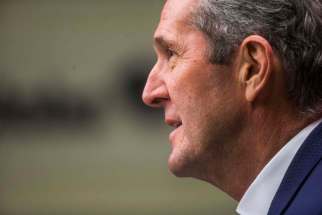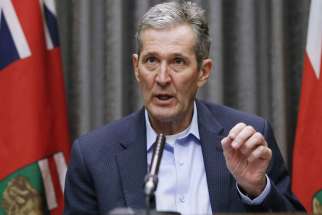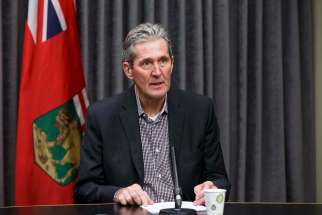Pallister determined to do it his way
Read this article for free:
or
Already have an account? Log in here »
To continue reading, please subscribe:
Monthly Digital Subscription
$0 for the first 4 weeks*
- Enjoy unlimited reading on winnipegfreepress.com
- Read the E-Edition, our digital replica newspaper
- Access News Break, our award-winning app
- Play interactive puzzles
*No charge for 4 weeks then price increases to the regular rate of $19.00 plus GST every four weeks. Offer available to new and qualified returning subscribers only. Cancel any time.
Monthly Digital Subscription
$4.75/week*
- Enjoy unlimited reading on winnipegfreepress.com
- Read the E-Edition, our digital replica newspaper
- Access News Break, our award-winning app
- Play interactive puzzles
*Billed as $19 plus GST every four weeks. Cancel any time.
To continue reading, please subscribe:
Add Free Press access to your Brandon Sun subscription for only an additional
$1 for the first 4 weeks*
*Your next subscription payment will increase by $1.00 and you will be charged $16.99 plus GST for four weeks. After four weeks, your payment will increase to $23.99 plus GST every four weeks.
Read unlimited articles for free today:
or
Already have an account? Log in here »
Hey there, time traveller!
This article was published 22/04/2020 (2062 days ago), so information in it may no longer be current.
One of the most crucial responsibilities of any government during a recession is to offset economic decline with stimulus spending.
That usually means borrowing significant sums against future tax revenues, to be repaid when the economy improves. When three of the four components of gross domestic product – consumer spending, business investment and net exports – slump during a recession, it’s critical for governments to step in with a robust spending plan. Fiscal expansionism during economic downturns is a widely accepted policy prescription. It’s proven to shorten periods of contraction and speed up economic recovery.
Owing to the COVID-19 pandemic, Manitoba and the rest of the world are entering one of the worst economic downturns in modern history. As a result of strict physical-distancing measures, the economy is suffering from widespread job losses, business closures and the shuttering of not-for-profit organizations.
Early economic forecasts are predicting the province’s GDP could shrink by close to four per cent in 2020. Without significant government intervention, the long-term economic consequences could be catastrophic.
What the premier fails to consider, though, is his measures will result in further economic contraction.
Manitoba Premier Brian Pallister doesn’t appear to subscribe to government-intervention policies during recessions. Rather than roll out a comprehensive stimulus package, Mr. Pallister has decided to do the opposite: he plans to implement new austerity measures. Instead of increasing government spending to boost aggregate demand and provincial GDP, the province is clawing back hours for public servants (and threatening layoffs) while imposing deep cuts to government-funded institutions.
Mr. Pallister has already suspended some home care services – including bathing, laundry, cleaning and respite – which have callously been deemed “non-essential.” He has announced plans to cut funding for post-secondary institutions, which could cripple academic programs and compromise the future education of students. He is also demanding other government agencies, including Crown corporations, reduce spending by as much as 30 per cent.
Mr. Pallister says the moves are necessary to limit how much new borrowing the province is forced to take on. He says he doesn’t want to saddle future generations with more debt than necessary. As it is, the province is projecting to borrow an estimated $5 billion more than planned this year in response to the pandemic.

What the premier fails to consider, though, is his measures will result in further economic contraction. Reduced government spending, especially during an extreme recessionary period such as this one, will reduce economic output. A drop in consumer spending, business investment and net exports – coupled with declining government spending – is a toxic cocktail that could result in years of economic damage.
It could cause a complete collapse of the economy. Under that scenario, income tax, corporate tax and consumption tax revenues would fall further, causing more damage to government’s bottom line. That’s the other, more dire, side of the equation Mr. Pallister is ignoring.
To its credit, Ottawa has stepped up with much-needed fiscal stimulus. Not only has the federal government rejected spending cuts, it has introduced several wage- and business-subsidy programs to limit economic decline. The province this week finally announced some modest relief for business, including a loan program (some of which may be forgivable) and by contributing to Ottawa’s commercial rent assistance program. But that will hardly make up for the deep spending cuts this province is planning.
Federal intervention alone is not enough to avert economic disaster in Manitoba. The provincial government must step up with an aggressive stimulus plan. Failure to do so could have incalculable consequences.





